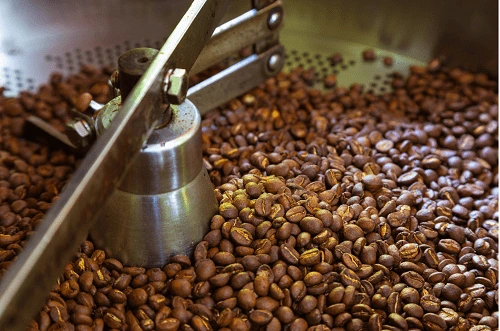Coffee
How to Start a Coffee Roasting Business
How to Start a Coffee Roasting Business?
Are you passionate about coffee? Do you dream of starting your own business in the coffee industry? Starting a coffee roasting business can be an exciting and rewarding venture. As the demand for specialty coffee continues to grow, there are ample opportunities for entrepreneurs to enter this market. In this article, we will guide you through the essential steps to kickstart your coffee roasting business successfully.
1. Introduction: The Rise of Specialty Coffee
Coffee has evolved from being a mere beverage to an experience cherished by millions worldwide. Specialty coffee, in particular, has gained immense popularity due to its distinct flavors and unique characteristics. This presents a lucrative opportunity for coffee enthusiasts to explore the world of coffee roasting and deliver exceptional products to discerning customers.
2. Market Research: Identifying Your Target Audience
Before diving into the coffee roasting business, it’s crucial to conduct thorough market research. Identify your target audience, understand their preferences, and determine the demand for specialty coffee in your locality. This research will help you tailor your products and marketing strategies to meet the needs of your customers effectively.
3. Developing a Coffee Roasting Business Plan
A well-defined business plan serves as the roadmap for your coffee roasting business. Outline your vision, mission, and goals. Include details about your target market, competition analysis, marketing strategies, and financial projections. A comprehensive business plan will not only guide you but also attract potential investors and lenders.
4. Finding Suppliers: Sourcing High-Quality Coffee Beans
To produce exceptional coffee, you need access to high-quality coffee beans. Establish relationships with reputable coffee suppliers or importers who can provide you with a diverse selection of beans from different regions. Consider factors such as origin, flavor profiles, and sustainability practices when choosing your suppliers.
5. Equipment and Setup: Setting Up Your Roasting Facility
Investing in the right equipment is essential for consistent and efficient coffee roasting. Purchase a commercial coffee roaster that suits your production capacity and budget. Create a dedicated space for your roasting facility, ensuring proper ventilation and safety measures. Additionally, set up a cupping lab to evaluate the quality of your coffee.
6. Roasting Techniques: Mastering the Art of Coffee Roasting
Coffee roasting is both a science and an art. Experiment with different roasting profiles to bring out the best flavors in your beans. Understand the stages of roasting, including first crack and second crack, and learn to control variables such as time, temperature, and airflow. Continuously refine your techniques to develop unique and consistent roasts.
7. Packaging and Branding: Creating an Appealing Product
The packaging and branding of your coffee play a vital role in attracting customers. Design an eye-catching logo and packaging that reflects your brand’s identity. Consider using sustainable packaging materials to align with the growing eco-conscious consumer base. Develop a compelling brand story that resonates with your target audience and sets you apart from competitors.
8. Creating a Distribution Strategy: Reaching Your Customers
Develop a distribution strategy to ensure your coffee reaches your target customers. Explore options such as selling directly to local cafes, restaurants, and specialty stores. Establish partnerships with wholesalers or distributors to reach a broader market. Consider online platforms and e-commerce solutions to expand your reach and offer convenience to customers.
9. Establishing an Online Presence: Building a Website and Social Media Presence
In today’s digital age, having a strong online presence is crucial for any business. Build a professional website that showcases your products, provides information about your brand, and enables online sales. Leverage social media platforms to engage with your audience, share brewing tips, and create a community around your brand.
10. Ensuring Quality Control: Consistency and Perfection
Maintaining consistent quality is key to building a reputable coffee roasting business. Implement rigorous quality control measures throughout the roasting process. Regularly cup your coffee to evaluate taste, aroma, and body. Keep detailed records of your roasting profiles and make adjustments as necessary to achieve consistent results.
11. Building Relationships: Networking and Collaborations
Networking within the coffee industry can open doors to new opportunities. Attend industry events, trade shows, and conferences to connect with fellow coffee professionals, suppliers, and potential customers. Collaborate with local cafes or specialty shops for joint promotions or limited edition blends. Building strong relationships can lead to valuable partnerships and increased visibility for your brand.
12. Financial Considerations: Budgeting and Pricing
Carefully manage your finances to ensure the profitability of your coffee roasting business. Create a detailed budget that accounts for equipment, raw materials, packaging, marketing, and operational expenses. Set competitive yet sustainable pricing that reflects the value of your product while considering market trends and customer expectations.
13. Legal Requirements and Permits
Complying with legal requirements and obtaining necessary permits is essential for operating a coffee roasting business. Research local regulations regarding food safety, labeling, and permits for roasting facilities. Consult with legal professionals to ensure you meet all the necessary requirements and maintain compliance.
14. Hiring and Training Staff
As your coffee roasting business grows, you may need to hire additional staff to manage operations effectively. Look for individuals with a passion for coffee and the ability to adapt to your company’s culture. Provide comprehensive training to ensure they understand your roasting techniques, quality standards, and customer service philosophy.
15. Conclusion
Starting a coffee roasting business requires passion, dedication, and a commitment to quality. By following these steps, you can establish a successful venture in the coffee industry. Remember to continuously innovate, adapt to changing consumer preferences, and nurture relationships with your customers and partners.
FAQs
1. How much capital do I need to start a coffee roasting business? The required capital depends on various factors such as equipment costs, location, and scale of operations. It’s recommended to create a detailed business plan and budget to determine your specific financial needs.
2. Do I need prior experience in coffee roasting to start this business? While prior experience in coffee roasting can be beneficial, it is not a prerequisite. With passion, dedication, and a willingness to learn, you can acquire the necessary skills and knowledge to excel in this industry.
3. How can I differentiate my coffee roasting business from competitors? Differentiation can be achieved through various means, such as offering unique blends, focusing on sustainability practices, providing personalized customer experiences, or collaborating with local businesses. Find your unique selling points and leverage them to stand out in the market.
4. How do I ensure the freshness of my roasted coffee? To ensure freshness, roast your coffee in small batches based on demand. Use airtight packaging with one-way valves to preserve the flavors and aromas. Encourage customers to consume the coffee within a specified timeframe for the best experience.
5. Is it possible to start a coffee roasting business from home? While starting small-scale operations from home is possible, it’s important to check local regulations and zoning laws regarding commercial activities from residential properties. Ensure you have the necessary equipment, space, and compliance with health and safety standards

